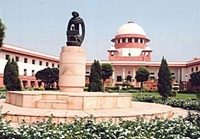Supreme Court quashes National Tax Tribunal Act
25 Sep 2014
The Supreme Court today held the National Tax Tribunal Act, under which a tribunal was set up to decide tax-related cases, usurping the jurisdiction of high courts in such matters, as unconstitutional.
 A five-judge constitutional bench headed by Chief Justice R M Lodha quashed the National Tax Tribunal Act, saying it was bad in law and failed the test of constitutional validity.
A five-judge constitutional bench headed by Chief Justice R M Lodha quashed the National Tax Tribunal Act, saying it was bad in law and failed the test of constitutional validity.
The bench said the Act, passed by Parliament in 2005, is "unconstitutional" as the National Tax Tribunal (NTT) encroaches upon the powers of higher judiciary, which can only decide issues involving substantial laws and not a tribunal.
The SC bench held that the government cannot vest a tribunal with judicial powers without according to it the characteristics of a court and ensuring its autonomy.
Also, the bench noted, the NTT sought to undermine the jurisdiction of the high courts in deciding tax related matters, as the government had specifically stated that the NTT was intended to reduce the pendency of cases in the high courts.
The order came on a batch of petitions by Madras Bar Associations and others challenging the validity of the Act, which could have substituted the high courts with tribunals that have no judicial powers or operational independence, which is against the basic structure of the Constitution.
The first petition was filed in 2006 by the Madras Bar Association and later many other lawyers bodies joined in challenging the Act.
For the NDA government, which had justified the creation of NTT, saying that it would help unclog the backlog of cases in the high courts, the SC order could prove a major jolt, especially at a time when the government is looking for speeding up the decision-making process.
The apex court pointed out that where the party before the NTT was always the ministry of finance, a quasi-judicial tribunal would not inspire confidence and it would shake the very foundation of the principles of independence of judiciary, rule of law and separation of powers.
This could spawn a host of quasi-judicial tribunals which would function as departments of various ministries, posing a grave danger that the judiciary would be substituted by tribunals.
The judgement will have a direct bearing on a petition that has challenged the validity of the National Company Law Appellate Tribunal.



















